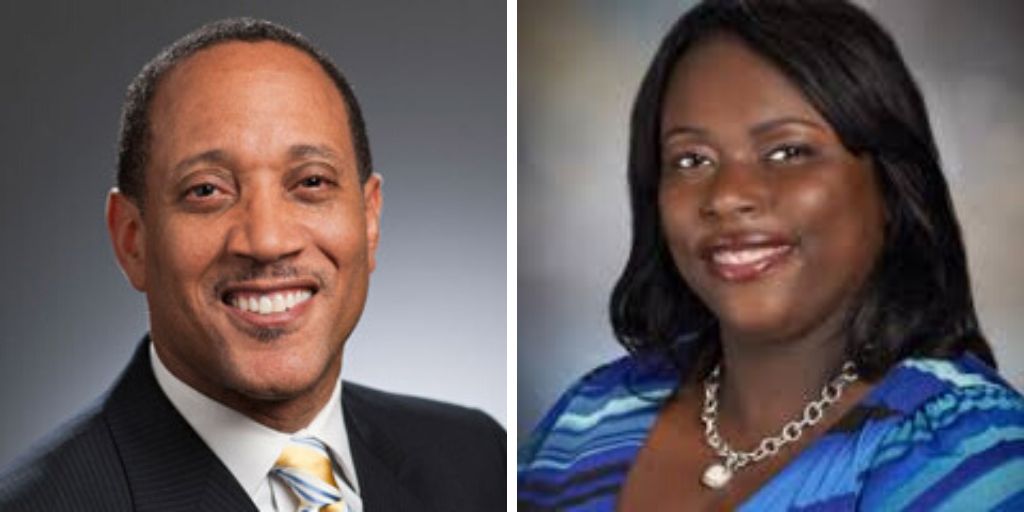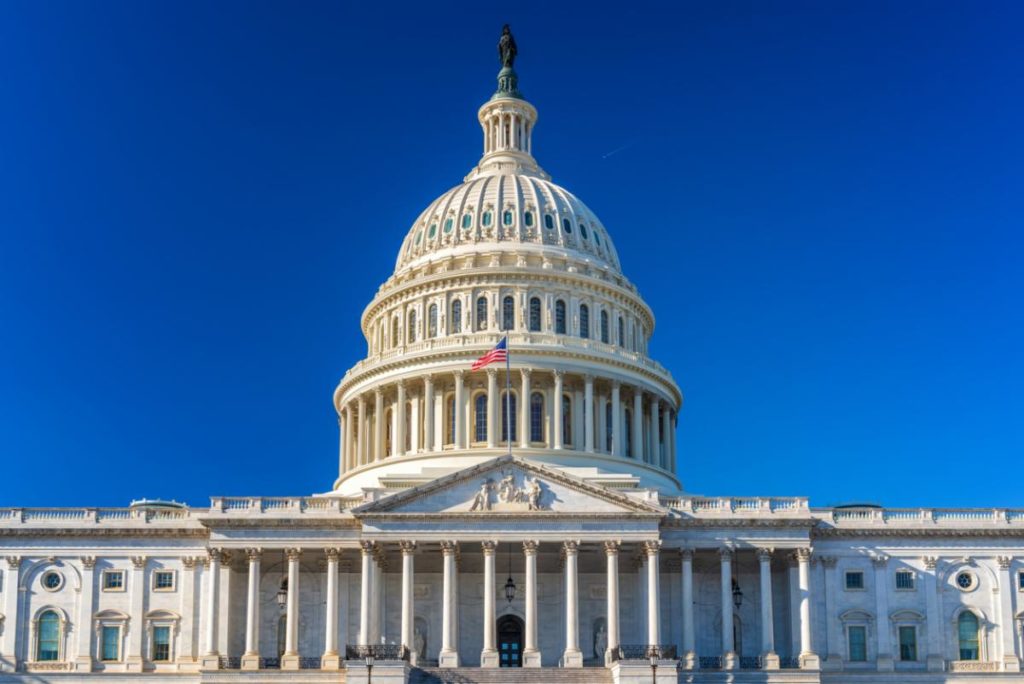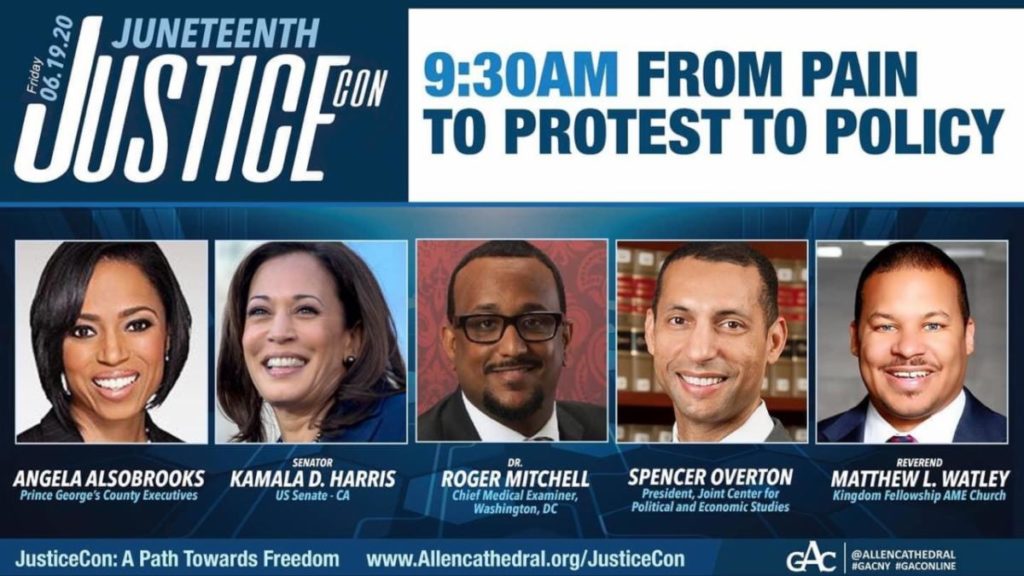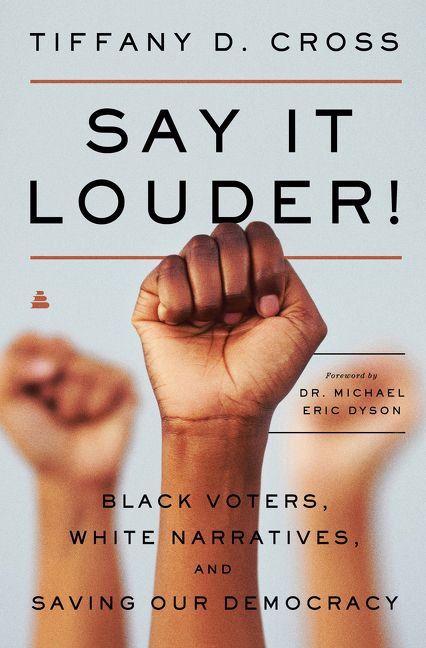
Joint Center News: June 2020
This is our regular monthly newsletter, which reviews all of the Joint Center’s work over the past month.
Every Monday, we also publish a weekly roundup of the latest news and analysis on COVID-19 policy and Black communities. Details are below on all of the Joint Center’s work for the past month—including but not limited to COVID-19.
The Joint Center Welcomes New Board Members

The Joint Center is delighted to announce two new board members—MacArthur Foundation Vice President and Chief Financial Officer Kenneth Jones and W.K. Kellogg Foundation Vice President for Program Strategy Carla Thompson Payton.
Kenneth Jones oversees all aspects of the finance, accounting, tax, audit, administrative services, and facilities functions for the MacArthur Foundation. Prior to joining MacArthur, Ken was the Vice President and CFO of the Annie E. Casey Foundation. Ken is the Immediate Past Board Chair of ABFE: A Philanthropic Partnership for Black Communities, and also serves on the boards of the Council on Foundations, the Mission Investors Exchange, and the Southern Education Foundation. Ken received his MBA from the MIT Sloan School of Management, a master’s degree in economics from the University at Buffalo, and a bachelor’s degree from Boston University.
As a member of the executive team of W.K. Kellogg Foundation (WKKF), Carla Thompson Payton leads the creative and strategic direction of the foundation’s programming from design through implementation, evaluation, and dissemination. Prior to joining WKKF, Carla served as Deputy Director of the Office of Child Care at the Administration for Children and Families in the U.S. Department of Health and Human Services in Washington, DC. She also served as the Assistant Superintendent for Early Childhood Education for the District of Columbia, where she initiated the first publicly funded pre-kindergarten program. Carla received her bachelor’s degree from Syracuse University, and a master’s degree in social work and a doctorate in educational leadership from the University of Pennsylvania.
Read their full bios here.
Economic Studies

Joint Center Vice President Jessica Fulton joined JPMorgan Chase Institute’s panel on “the economic impact of COVID-19 on minority communities, targeted financial support for families, and what can be done to promote inclusive recovery.” Other panelists included National Urban League President Marc Morial and PolicyLink President & CEO Michael McAfee.
Joint Center President Spencer Overton discussed the unique employment and health challenges faced by aging African Americans amid the COVID-19 pandemic at AARP’s Social Innovation Summit Virtual Conference. Other panelists included George Washington University Public Health Professor Dr. Dora Hughes and Bank of America Managing Director Surya Kolluri. AARP Foundation President Lisa Marsh Ryerson moderated the conversation.

Jessica was quoted in a Time Magazine article on how minority-owned businesses are struggling during the COVID-19 pandemic, and how the Paycheck Protection Program initially failed to reach Black entrepreneurs. “This is all part of what happens when you’re not including Black communities meaningfully in policy conversations around issues that matter,” said Jessica the article. “The failures of the PPP could have been resolved from the beginning if there were folks in the room who were familiar with the barriers Black businesses might face.”
Jessica also spoke to the New York Times about how the COVID-19 pandemic is affecting the unemployment rate of Black women.
Jessica was also quoted in the Center for Public Integrity’s analysis on the murder of George Floyd, the coronavirus, and “inequality stealing Black lives.”
Jessica joined the Committee for Economic Development and the Conference Board’s podcast Sustaining Capitalism to discuss COVID-19’s impact on Black communities.
On June 16, Jessica moderated Inequality in the Pandemic: Entrepreneurs of Color at Opportunity Finance Network’s Small Business Finance Forum. Presenters included U.S. Black Chambers President/CEO Ron Busby, National Association for Latino Community Asset Builders (NALCAB) Executive Director and CEO Noel Poyo, and Business Center for New Americans Founder and Executive Director Yanki Tshering.
A 2008 Joint Center report, Environmental Justice Through The Eye of Hurricane Katrina, was cited in a Washington Post column on how racism and climate change are connected.
Political Studies

Joint Center President Spencer Overton testified at a congressional hearing on disinformation online, voter suppression, and Section 230 of the Communications Decency Act. Spencer testified that while some social media companies do not remove disinformation because they say they want to be “viewpoint neutral,” the resulting harms—such as voter suppression—are not “neutral” for Black communities. While Spencer disagreed with President Trump’s recent executive order on Section 230 in retaliation to Twitter, he acknowledged that the status quo is not working. He testified that even in the aftermath of the killing of George Floyd, there exists a real question about whether social media companies will address their own systemic shortcomings and fully embrace civil rights principles. Earlier this year, Spencer published State Power to Regulate Social Media Companies to Prevent Voter Suppression in the University of California, Davis Law Review.
Two days after the congressional testimony of Spencer and other expert witnesses, Facebook CEO Mark Zuckerberg announced modifications to the company’s hate speech and voter disinformation policies. In response, the Joint Center and nine other organizations (the Leadership Conference, Color of Change, the NAACP, the NAACP Legal Defense and Educational Fund, the National Urban League, AAJC, Muslim Advocates, UnidosUS, and Voto Latino) issued a joint statement: “While we welcome any progress in Facebook’s policies, today’s announcement continues the company’s practice of taking incremental steps while avoiding the core issues that endanger the rights of the communities we represent. This nibbling at the edges represents the company’s ongoing failure to fully appreciate the harmful impact of disinformation on elections and the proliferation of hate speech and violence, particularly for communities of color. Facebook needs to improve and enforce its own policies and stop the weaponization of its platform to suppress the vote, spread hate, and undermine our democracy. This announcement is another stark reflection of the lack of civil rights expertise at Facebook.”
Spencer also discussed key issues regarding Section 230 and the 2020 election at the Knight Foundation and Gallup’s webinar launch event for their latest report, American Views: Trust, Media and Democracy. During the discussion, Spencer noted that 84% of respondents in the Knight Foundation and Gallup survey believe that social media companies should be liable for intentionally misleading information on elections and political issues, and that targeted election ads can result in not just polarization or foreign interference–but real racial discrimination. He also provided solutions to this key issue.

Joint Center Senior Fellow of Diversity & Inclusion Dr. LaShonda Brenson wrote a blog post reviewing LegiStorm’s latest data on staff salaries by race on the Hill. In her analysis, LaShonda notes that the 9.2% pay differential between the salaries of the average Black staffer and the average white staffer is the largest reported pay disparity between Black and white staffers on the Hill since LegiStorm began collecting data in 2000. The study’s results were released after the Select Committee on the Modernization of Congress held a virtual on staffing reforms on Capitol Hill which included a discussion on how to improve staff diversity and retention. Experts noted that childcare, parental leave, student loan repayment programs, work-from-home policies, bonuses, and “standarized benefits and training across offices” are some of the best ways to ensure diversity and retention among staffers. They also discussed best practices to measure success such as collecting better data on staff compensation and demographics, and exit surveys.
LaShonda was also quoted in a Clearance Jobs article where she explained that racial diversity among congressional staff is critical because staffers inform legislation that affects everyone in the United States, including the 40% who are people of color.
Spencer was a special guest at the Washington Government Relations Group’s discussion on “race relations in the workplace and social justice reform.” Spencer was joined by National Urban League, Washington Bureau Executive Director Clint Odom.
The Joint Center signed a letter with 453 other organizations urging the U.S. House and Senate to “take swift and decisive legislative action in response to ongoing fatal police killings and other violence against Black people across our country.” The letter—organized by the Leadership Conference and addressed to House Speaker Nancy Pelosi (D-CA), House Minority Leader Kevin McCarthy (R-CA), Senate Majority Leader Mitch McConnell (R-KY), and Senate Minority Leader Chuck Schumer (D-NY)—includes eight federal reforms for police accountability.

On Juneteenth (June 19), Spencer spoke on the From Pain to Protest to Policy panel at JusticeCon: A Path Towards Freedom on Juneteenth hosted by the Greater Allen A.M.E. Cathedral of New York. Other panelists included Prince George County Executive Angela Alsobrooks, Senator Kamala Harris (D-CA), Washington DC Chief Medical Examiner Dr. Roger Mitchell, and Kingdom Fellowship AME Church Executive Minister Rev. Matthew L. Watley (moderator).
Dr. James R. Jones, who authored the Joint Center’s 2015 report Racial Diversity Among Top Senate Staff, released a new report with Pay Our Interns entitled The Color of Congress: Racial Representation Among Interns in the U.S. House of Representatives. The report reveals major racial disparities among congressional interns and that both Democratic and Republican white lawmakers have overwhelmingly white interns.
Solidarity Strategies President and Former Senior Adviser to Senator Bernie Sanders (D-VT) Chuck Rocha wrote a New York Times op-ed on the importance of racial diversity in campaign and legislative offices.
Podcasts

On his weekly podcast, WashingTECH Host Joe Miller spoke with Public Knowledge President and CEO Christopher Lewis on “regulating social media,” African American Mayors Association President and Newport News Mayor McKinley L. Price on tech justice, Bandwagon Founder and CEO Harold Hughes on “privacy best practices for startups,” and the Brennan Center’s Election Security Program Counsel Gowri Ramachandran on 2020 election security and COVID-19. The podcast is available on Apple Podcasts, Spotify, and WashingTECH’s website. Listen here.
Now Hiring
The Joint Center is seeking a Technology Policy Fellow / Senior Fellow to lead the Joint Center’s tech policy program. The person will be responsible for building the Joint Center’s expertise and influence on key tech policy issues through research, building the Joint Center’s network of experts, and engaging in public education on timely policy issues affecting Black communities. Candidates should apply by July 9, 2020.
Upcoming
Recently the Ava DuVernay-executively produced documentary And She Could Be Next premiered on PBS. The documentary, which was supported by the Democracy Fund, “tracks the history-making efforts of women like Stacey Abrams (D-GA), Rashida Tlaib (D-MI), Lucy McBath (D-GA), Veronica Escobar (D-TX), Maria Elena Durazo (D-CA), and Bushra Amiwala (D-IL), claiming their ‘rightful place in the pantheon of leaders,’ and building a democracy that we can all believe in.” Learn more about the film here.

On July 2 at 1 pm EST/10 am PDT, Marguerite Casey Foundation will host i, a live conversation on the “crisis of this moment and the possibility of a future organized around movement.” Marguerite Casey Foundation President & CEO Carmen Rojas will moderate the conversation between panelists former Secretary of Housing & Urban Development Julián Castro, Mijente Co-Founder Marisa Franco, and Ohio State University Professor and Kirwan Institute Executive Director Darrick Hamilton.

On July 6, former campaigner, cable news veteran, and The Beat newsletter writer Tiffany D. Cross will release her debut book Say It Louder! Black Voters, White Narratives, and Saving Our Democracy (pre-order here). The book will provide “a reflective look at the endless efforts attempting to deny people of color the right to vote and the countless attempts to mute Black voices.”

On July 14, Joint Center Senior Fellow of Diversity & Inclusion Dr. LaShonda Brenson will join prominent thought leaders on a panel to discuss why having diverse congressional staff is critical at this moment. The discussion will take place at Women in Government Relations’ Diversity, Equity & Inclusion Virtual Summit.
The University of California Berkeley is offering a summer course on the Freedom Summer which will include a voter outreach internship.

